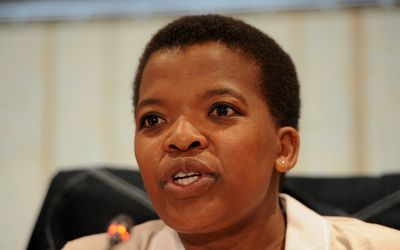WHILE confusion has been sown in the African National Congress (ANC) over the possibility of a female president or a third term for Jacob Zuma, there is a strong push within the Congress of South African Trade Unions (Cosatu) for its first female general secretary.
Second deputy president Zingiswa Losi is being lobbied by some in Cosatu to stand for the position in November, when the federation elects its new leadership.
But I am getting ahead of myself.
Before Cosatu elects new leaders, it will face a true test of its lingering grit and might as it hosts a protest march against labour brokers on October 7.
Exactly seven days before this event, its former general secretary, Zwelinzima Vavi, and dismissed affiliate, the National Union of Metalworkers of SA (Numsa), will test their pull when they hold a day-long protest against corruption.
And on Thursday, this event took a titillating twist, when Economic Freedom Fighters leader Julius Malema told journalists that he and his party would join Vavi and Numsa leader Irvin Jim in the march.
It will be a spectacle — love him or hate him, Malema can pull a crowd.
Cosatu will have to be sure it can draw out the bulk of its members to match the number that is now expected to participate in Vavi’s march against corruption.
Finally, the true grit of this oft-maligned beast called labour on both sides of the factional divide will reveal itself at the end of the month.
Back to Losi.
She has a rather interesting recent history in the federation, which in my view overshadowed her past contribution to the labour movement.
She hit the headlines as the Vavi-aligned faction in Cosatu sought to remove her from her post. She was a member of Numsa at the time of her election as Cosatu’s second deputy president and became dangerously embroiled in the factional fight between Vavi and Cosatu president Sdumo Dlamini.
Her tale is well known in the federation. As Cosatu approached its divisive national congress in 2012 — at which Vavi or Dlamini avoided being ousted through a last-minute peace deal — her union, Numsa, is said to have called her in and given her the line of march: support Vavi or else.
Losi refused.
She then became a pawn in the wider battle for the soul of Cosatu. She was suspended by Numsa and resigned from her job at Ford in the Eastern Cape. Due to her links to the Dlamini faction, she was able to obtain a post in the police — and became a shop steward for the Dlamini-aligned police union, Popcru.
Numsa and its allies cried foul, saying she was no longer eligible to hold her position. But what is not widely known outside union circles is that Losi began her career in the air force. It was discriminatory labour practices there in the 1990s that saw her naturally tend towards organisations that sought to protect workers.
Losi would be Cosatu’s first female general secretary. Her election would also go some way in repairing the damage to gender dynamics in the federation by Vavi’s affair with a Cosatu staffer.
But there are some drawbacks — she seems to lack the appetite for the task; while she hails from an industrial union, she is now a shop steward in a public sector union. Dlamini is also an office bearer with public sector roots. The election of public sector representatives in both the position of president and general secretary would simply cement Cosatu as a public sector federation to the detriment of its, albeit tiny, industrial remnants.
But, as in the ANC, the outcome of the battle to lead Cosatu as it enters a new era of stiff competition is far from set in stone. Other strong contenders for the post of general secretary include South African Transport and Allied Workers Union general secretary Zenzo Mahlangu, acting general secretary Bheki Ntshalintshali and secretariat co-ordinator Zakhele Cele.
Cele is seen as a contender because he is a strong administrator and cut his teeth in congress politics. A large drawback for him, however, is that he has never served on the shop floor. It does complicate matters somewhat.
Cosatu will have to think carefully about its leaders in future — particularly if Vavi and Numsa prove to be formidable competitors when they draw out workers on September 30.
• Marrian is political editor.

Zingiswa Losi. Source: SAPA/WERNER BEUKES
WHILE confusion has been sown in the African National Congress (ANC) over the possibility of a female president or a third term for Jacob Zuma, there is a strong push within the Congress of South African Trade Unions (Cosatu) for its first female general secretary.
Second deputy president Zingiswa Losi is being lobbied by some in Cosatu to stand for the position in November, when the federation elects its new leadership.
But I am getting ahead of myself.
Before Cosatu elects new leaders, it will face a true test of its lingering grit and might as it hosts a protest march against labour brokers on October 7.
Exactly seven days before this event, its former general secretary, Zwelinzima Vavi, and dismissed affiliate, the National Union of Metalworkers of SA (Numsa), will test their pull when they hold a day-long protest against corruption.
And on Thursday, this event took a titillating twist, when Economic Freedom Fighters leader Julius Malema told journalists that he and his party would join Vavi and Numsa leader Irvin Jim in the march.
It will be a spectacle — love him or hate him, Malema can pull a crowd.
Cosatu will have to be sure it can draw out the bulk of its members to match the number that is now expected to participate in Vavi’s march against corruption.
Finally, the true grit of this oft-maligned beast called labour on both sides of the factional divide will reveal itself at the end of the month.
Back to Losi.
She has a rather interesting recent history in the federation, which in my view overshadowed her past contribution to the labour movement.
She hit the headlines as the Vavi-aligned faction in Cosatu sought to remove her from her post. She was a member of Numsa at the time of her election as Cosatu’s second deputy president and became dangerously embroiled in the factional fight between Vavi and Cosatu president Sdumo Dlamini.
Her tale is well known in the federation. As Cosatu approached its divisive national congress in 2012 — at which Vavi or Dlamini avoided being ousted through a last-minute peace deal — her union, Numsa, is said to have called her in and given her the line of march: support Vavi or else.
Losi refused.
She then became a pawn in the wider battle for the soul of Cosatu. She was suspended by Numsa and resigned from her job at Ford in the Eastern Cape. Due to her links to the Dlamini faction, she was able to obtain a post in the police — and became a shop steward for the Dlamini-aligned police union, Popcru.
Numsa and its allies cried foul, saying she was no longer eligible to hold her position. But what is not widely known outside union circles is that Losi began her career in the air force. It was discriminatory labour practices there in the 1990s that saw her naturally tend towards organisations that sought to protect workers.
Losi would be Cosatu’s first female general secretary. Her election would also go some way in repairing the damage to gender dynamics in the federation by Vavi’s affair with a Cosatu staffer.
But there are some drawbacks — she seems to lack the appetite for the task; while she hails from an industrial union, she is now a shop steward in a public sector union. Dlamini is also an office bearer with public sector roots. The election of public sector representatives in both the position of president and general secretary would simply cement Cosatu as a public sector federation to the detriment of its, albeit tiny, industrial remnants.
But, as in the ANC, the outcome of the battle to lead Cosatu as it enters a new era of stiff competition is far from set in stone. Other strong contenders for the post of general secretary include South African Transport and Allied Workers Union general secretary Zenzo Mahlangu, acting general secretary Bheki Ntshalintshali and secretariat co-ordinator Zakhele Cele.
Cele is seen as a contender because he is a strong administrator and cut his teeth in congress politics. A large drawback for him, however, is that he has never served on the shop floor. It does complicate matters somewhat.
Cosatu will have to think carefully about its leaders in future — particularly if Vavi and Numsa prove to be formidable competitors when they draw out workers on September 30.
• Marrian is political editor.





















